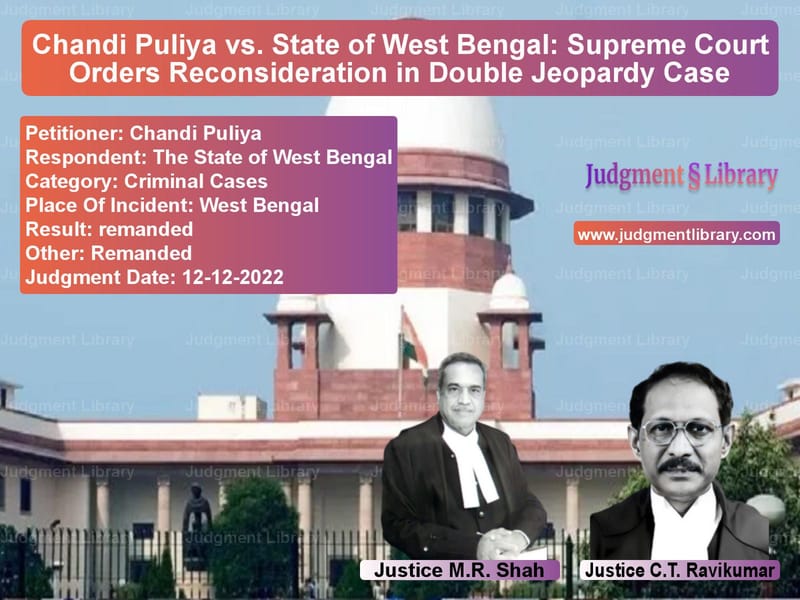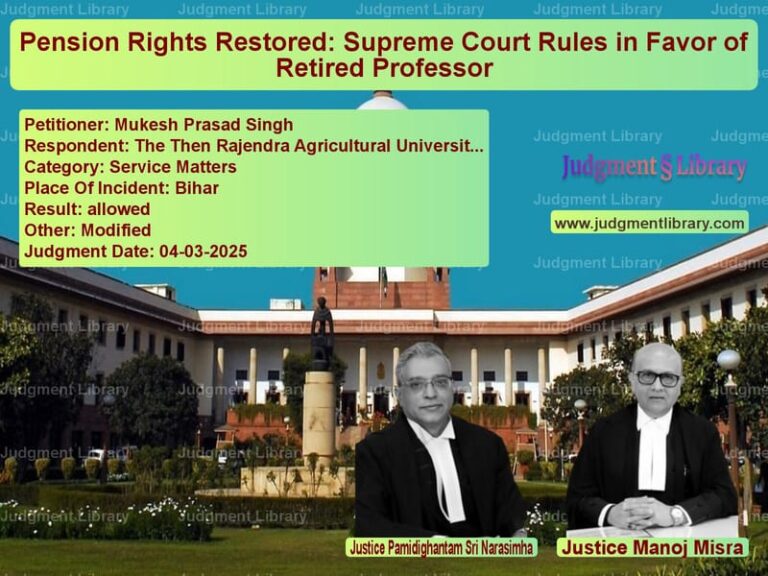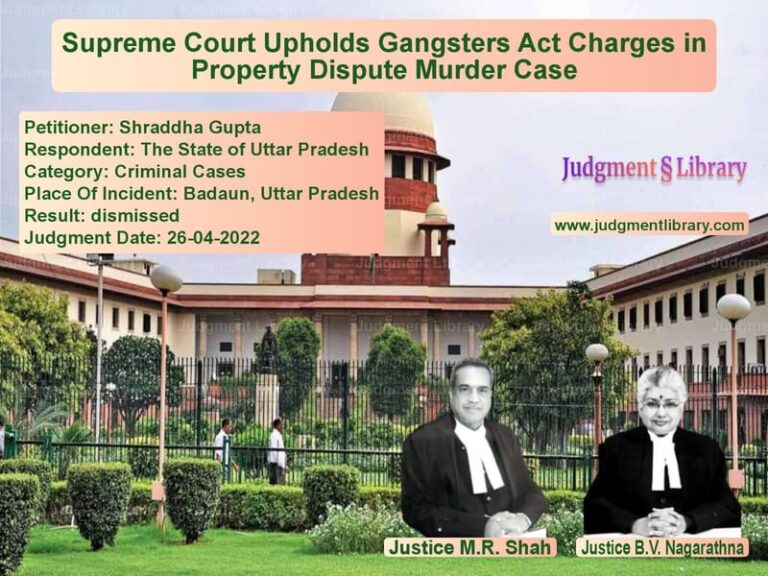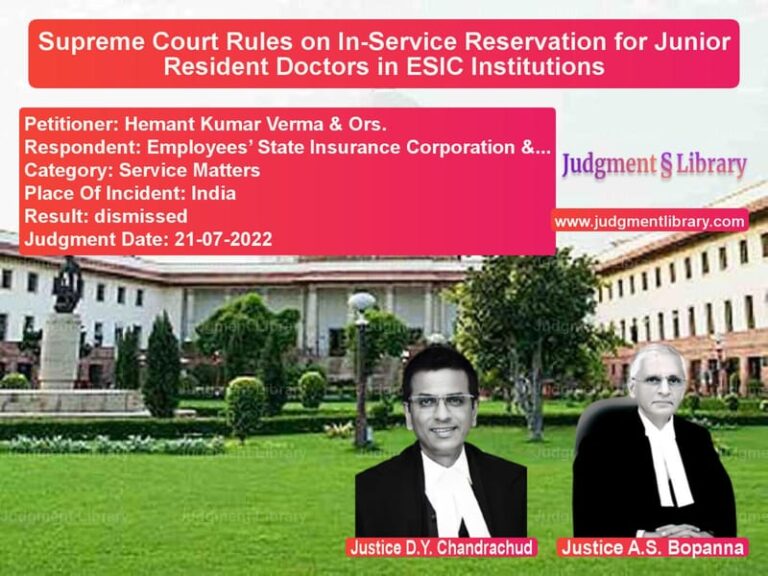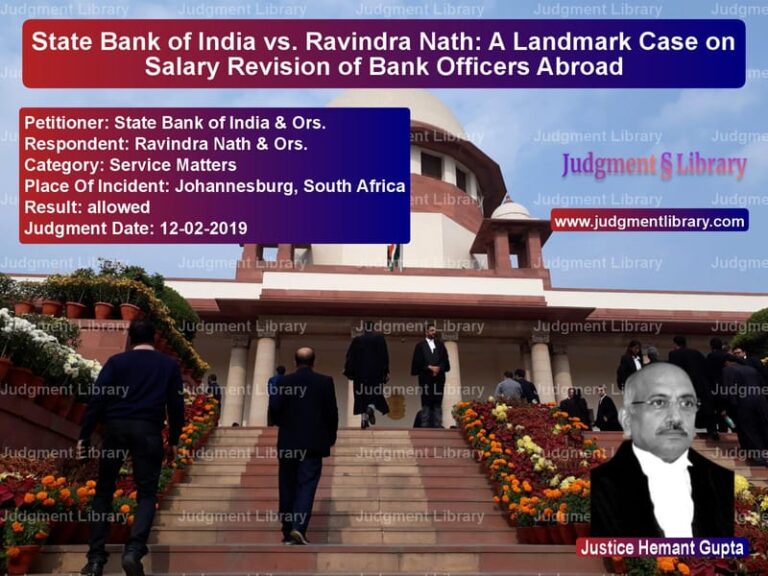Chandi Puliya vs. State of West Bengal: Supreme Court Orders Reconsideration in Double Jeopardy Case
The Supreme Court of India, in its judgment dated December 12, 2022, in the case of Chandi Puliya vs. The State of West Bengal, quashed the judgment of the Calcutta High Court and remanded the case to the trial court for reconsideration. The appeal revolved around whether the appellant, who had already been acquitted in a prior case, could be prosecuted again under a subsequent FIR for the same set of facts, invoking the principle of double jeopardy under Section 300(1) of the Code of Criminal Procedure (CrPC).
Background of the Case
The appellant, Chandi Puliya, was previously tried for offenses under Sections 148, 149, 448, 364, and 506 of the Indian Penal Code (IPC) in FIR No. 61/2002 dated September 26, 2002, filed at Keshpur Police Station. After trial, he was acquitted by the Sessions Court on May 21, 2010.
However, on June 6, 2011, almost nine years after the initial FIR and one year after the acquittal, a second FIR was registered against the appellant and others, alleging that they had caused the death of Ajay Acharya, the same person they had allegedly kidnapped in the previous case. The second FIR was filed based on the discovery of a skeleton, with the deceased’s son identifying the clothes and teeth of the skeleton nearly 11 years after the alleged incident.
The appellant moved the Calcutta High Court seeking quashing of the entire criminal proceedings under the second FIR. The High Court dismissed the application but granted liberty to raise the issue at the time of framing of charges. The appellant then filed a discharge application under Section 227 read with Section 300(1) CrPC before the trial court, which was dismissed, leading to an appeal before the Supreme Court.
Arguments Presented
Petitioners’ (Chandi Puliya) Arguments
The appellant, represented by his counsel, argued:
- The principle of double jeopardy under Section 300(1) CrPC prohibits a person from being tried again for the same offense after acquittal.
- His acquittal in 2010 was based on the same facts that were being used to prosecute him in the subsequent FIR.
- The discovery of the skeleton did not provide a new cause of action sufficient to circumvent Section 300(1) CrPC.
- The trial court erred in not considering the discharge application under Section 300(1) CrPC before framing charges.
Respondents’ (State of West Bengal) Arguments
The State of West Bengal, represented by its counsel, countered:
- The previous case involved charges of kidnapping and unlawful confinement, while the present case was for murder under Section 302 IPC.
- At the time of the first FIR, the victim’s body was not found, so the prosecution could not charge the accused with murder.
- The second FIR was based on new evidence—the discovery of the skeleton and identification by the deceased’s son.
- The discharge application under Section 227 CrPC was premature, as the proper stage to challenge the charges was during framing under Section 228 CrPC.
Supreme Court’s Observations
The Supreme Court analyzed the facts and applicable legal principles, observing:
- “The stage of discharge under Section 227 CrPC is a stage prior to the framing of charge under Section 228 CrPC, and it is at this stage that the court can consider an application under Section 300(1) CrPC.”
- “Once the court rejects the discharge application, it proceeds to framing of charge under Section 228 CrPC, where the question of whether the accused committed the offense takes precedence.”
- “The trial court erred in dismissing the discharge application without examining the applicability of Section 300(1) CrPC.”
- “Since the High Court had earlier dismissed the accused’s petition under Section 482 CrPC seeking to quash the second FIR, the trial court must now independently evaluate the double jeopardy claim at the discharge stage.”
Judgment and Ruling
The Supreme Court ruled as follows:
- The judgment of the Calcutta High Court was quashed.
- The matter was remanded to the trial court to consider the appellant’s plea under Section 300(1) CrPC at the discharge stage.
- The trial court was directed to complete the proceedings within six weeks.
- The court clarified that it was not making any observations on the merits of the double jeopardy claim, which was left for the trial court to decide.
Implications of the Judgment
This ruling has significant implications for criminal law and the application of double jeopardy in India:
- Clarification on Double Jeopardy: The judgment reinforces that a subsequent trial for the same set of facts, even if under a different charge, must be carefully scrutinized under Section 300(1) CrPC.
- Discharge Stage Must Consider Section 300(1) CrPC: Courts must evaluate double jeopardy claims before framing charges rather than deferring them to a later stage.
- Reinforcement of Legal Procedure: The ruling ensures that accused persons have an opportunity to challenge duplicate proceedings at an early stage.
Conclusion
The Supreme Court’s decision in Chandi Puliya vs. The State of West Bengal reaffirms the principle of double jeopardy under Indian law. By directing the trial court to reconsider the discharge application before framing charges, the Court has ensured that the accused is not subjected to unnecessary legal hardship. This judgment serves as a critical precedent in safeguarding individual rights against repeated prosecution on the same facts.
Read also: https://judgmentlibrary.com/supreme-court-convicts-accused-in-rajasthan-land-dispute-murder-case/
Petitioner Name: Chandi Puliya.Respondent Name: The State of West Bengal.Judgment By: Justice M.R. Shah, Justice C.T. Ravikumar.Place Of Incident: West Bengal.Judgment Date: 12-12-2022.
Don’t miss out on the full details! Download the complete judgment in PDF format below and gain valuable insights instantly!
Download Judgment: chandi-puliya-vs-the-state-of-west-be-supreme-court-of-india-judgment-dated-12-12-2022.pdf
Directly Download Judgment: Directly download this Judgment
See all petitions in Murder Cases
See all petitions in Attempt to Murder Cases
See all petitions in Judgment by Mukeshkumar Rasikbhai Shah
See all petitions in Judgment by C.T. Ravikumar
See all petitions in Remanded
See all petitions in Remanded
See all petitions in supreme court of India judgments December 2022
See all petitions in 2022 judgments
See all posts in Criminal Cases Category
See all allowed petitions in Criminal Cases Category
See all Dismissed petitions in Criminal Cases Category
See all partially allowed petitions in Criminal Cases Category

